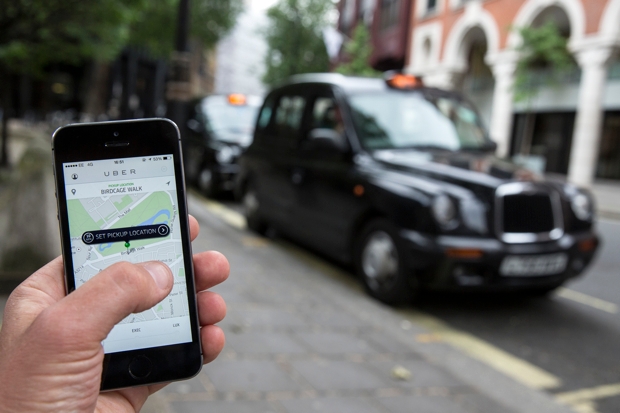Black cab drivers are striking in London today because they are angry that Uber – a rival taxi service supported by Google – is undercutting their market. They will argue that Uber’s drivers are using a smartphone app to calculate fares, despite it being illegal for private vehicles to be fitted with taximeters.
I couldn’t care less about the intricacies of this argument (the High Court can figure that one out). All I care about is getting home safely and it not costing too much. Uber offers me that.
I’m wary of jumping into unlicensed minicabs. As those spooky tube adverts remind you, ‘If your minicab’s not booked, it’s just a stranger’s car’. But with Uber, they are booked. In fact, you get far more information about your driver than you’d ever expect to receive from a black cab driver. After you book via the efficient app, you are sent the details of your driver: name, phone number, type of car, number plate. You are also sent their rating, based on other customers’ experience (interestingly, Uber drivers are also able to rate you, and a higher rating may mean you are picked up quicker). Any driver who drops below a certain mark loses their right to use the Uber app – a level of accountability black cabs have never offered. The app also allows someone to track your ride home, and a button allows you to share your estimated arrival time with whoever you wish.
On the matter of cost, Uber is normally much cheaper than a black cab because it relies on surge pricing – free-market economics essentially. When demand is high, prices go up (during Hurricane Sandy in New York, Uber prices doubled for example; Friday nights are also more expensive). When demand is low, prices go down. I simply can’t afford regular use of black cabs, but for a lot of the time, I can afford to use Uber. A free market creates new winners, and new losers – and in this case, black cabs are the losers. They may look good on our streets, but if they ignore the need to modernise, soon they will simply become relics for tourists.
The black cab’s plight is self-made. Technology is increasingly being used to offer customers better, more reliable and cheaper options, and any industry ignores this at its peril. In the battle between iconic and innovative, it’s hard to feel too nostalgic when you’re being offered a better deal. Capitalism is alive on the roads of London – and for a 24-year-old girl trying to get round the city, that’s great news.







Comments